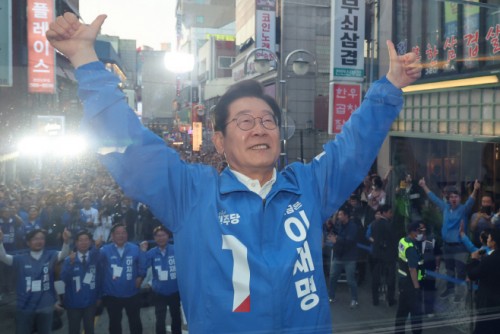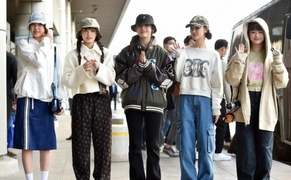 |
| Lee Jae-myung, presidential candidate of the Democratic Party of Korea (DPK), raises both arms to greet supporters during a campaign rally on Shinbu Cultural Street in Dongnam District, Cheonan, South Chungcheong Province, on May 25. / Source: Yonhap News |
On the 15th day of official campaigning, Democratic Party of Korea (DPK) presidential candidate Lee Jae-myung is focusing on southeastern Gyeonggi Province, a key region within the Seoul metropolitan area. His stops on May 26 include Suwon, Yongin, and Namyangju, where he aims to present a comprehensive vision for innovation, infrastructure, and regional growth.
DPK chief spokesperson Cho Seung-rae outlined the itinerary in a briefing at party headquarters, stating, “Lee is visiting the heart of the capital region to share his vision for a revitalized Korea.” Cho emphasized the symbolic and strategic value of the region, noting Suwon’s historic Hwaseong Fortress—an emblem of Korea’s Renaissance under King Jeongjo—and Yongin’s status as the nation’s semiconductor hub. He added that Namyangju is fast emerging as a future million-person city.
Lee’s first event of the day is an 11 a.m. town hall at Ajou University, where he will meet with students from five colleges, including engineering, ICT, and humanities faculties. Cho explained that Ajou University played a notable role in Korea’s pro-democracy movement, with students leading declarations against martial law. Lee plans to engage in candid dialogue with students about their academic and economic concerns, while outlining a national vision that includes greater opportunities for youth.
At 1 p.m., Lee will hold a campaign rally at Suwon’s Yeongdong Market. There, he is expected to reflect on his time as Gyeonggi governor and propose solutions for longstanding local issues, including the relocation of Suwon Air Base and the development of a compact city integrating sports and culture. Lee will also introduce forward-looking plans such as a semiconductor and AI super-gap innovation cluster and the creation of a K-Silicon Valley centered on R&D and science parks.
At 2:40 p.m., Lee will greet voters in front of Dankook University’s Jukjeon Campus in Yongin. Given the city’s role as a core hub of the national semiconductor industry, he will announce specific plans including the accelerated development of the Yongin Semiconductor Cluster, a special semiconductor industry law, expanded tax incentives, and green infrastructure under RE100 standards.
Lee’s final stop is a 4:30 p.m. rally at Pyeongnae-Hopyeong Station Plaza in Namyangju. Cho described Namyangju as a dynamically growing city, where Lee will propose designating the Wangsuk District as a national advanced strategic industry zone to further accelerate local development.
The campaign also highlighted Lee’s broader plans for southeastern Gyeonggi residents—many of whom commute to Seoul daily—emphasizing policies aimed at improving quality of life. Lee is expected to announce proposals for educational reform, affordable housing, and transportation upgrades, including the expansion of metro lines 6, 8, and 9 in Namyangju; development of the GTX line; and construction of metropolitan and high-speed roads such as the second Yongin-Seoul Expressway.
Lee’s third week of campaigning also launches his “1-2-3” campaign slogan—“Candidate No. 1, Lee Jae-myung, needs three more votes”—urging voters to support the DPK in all key ballot categories. “He will win through the people’s choice,” Cho stated, “and together with the sovereign voters, he will open the door to a new Republic of Korea.”
Most Read
-
1
-
2
-
3
-
4
-
5
-
6
-
7





















